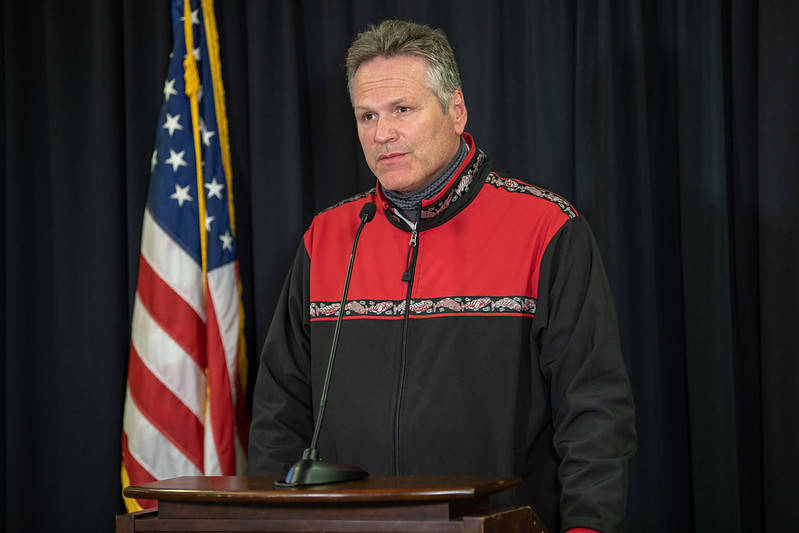Gov. Mike Dunleavy touted an influx of equipment and facilities to fight increased COVID-19 spread Wednesday during a news conference.
Increased testing kits, new rapid testing machines, easy-to-use tests for rural hospitals and clinics, supply-chain improvements, 3.5 million pairs of gloves, a new commercial testing lab, a testing site in Nome and more contact tracing personnel are all part of efforts to stymie spread of the coronavirus and address areas of need in case the state’s health care capacity is tested, the governor’s office announced.
Dunleavy said the rising number of new cases of COVID-19 in Alaska, the U.S. and world should be taken seriously but should not inspire panic. He also characterized increasing case counts as unsurprising. The state announced 353 new cases and one death for Alaska on Wednesday, and so far, triple-digit increases have been reported each day this month.
“The next couple of months are going to be difficult, there’s no doubt about it,” Dunleavy said. “As I mentioned, this is occurring in many parts of the world and across the United States. We have a pretty good health team. We have a pretty good understanding of how this virus operates.”
He said all indications are that progress is being made on a vaccine against COVID-19, and that a vaccine could be deployed “at the end of November, into December, January, February, March, April.”
The state has submitted its vaccination plan to the federal government, and in a news briefing Thursday state epidemiologist Dr. Joe McLaughlin said federal authorities have asked states to be ready to distribute a vaccine by Nov. 15.
“That just means we’re ready,” McLaughlin said. “It’s most likely we’ll start to see a vaccine come to states later than that.”
He emphasized that COVID-19 is both real and highly contagious but less lethal than some early models predicted.
“It’s easily spread, one of the most easily spread in recent memory if not the last 100 years,” Dunleavy said. “If we do become infected, for most of us, it’s not a death sentence but for some of us, it’s very problematic.”
Dunleavy said working together to limit that spread means wearing masks, working remotely as much as possible, avoiding group gatherings and regular handwashing.
“I think if we put in a renewed effort in those areas, it’s going to buy us time,” Dunleavy said.
During the news conference, Dunleavy said he did not plan to enact a statewide mask mandate and instead said such mandates should come from local governments. He cited Juneau’s ordinance as one such example.
There will be discussion of extended the state’s declaration of a public health disaster emergency next week, Dunleavy said. The disaster declaration is set to expire on Nov. 15.
Additionally, Dunleavy “nothing is off the table” in terms of going back to one of the state’s earlier and more restrictive health mandates that limited group gatherings and travel. Hospital and intensive care unit capacity are among the factors that would be considered before reissuing a mandate, Dunleavy said.
“If it looks like it’s getting ahead of us, this virus, then we’ll have a discussion about what mitigating events, procedures, et cetera, we have to take,” Dunleavy said.
• Contact Ben Hohenstatt at (907)308-4895 or bhohenstatt@juneauempire.com. Follow him on Twitter at @BenHohenstatt.


